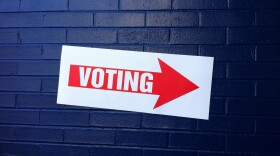This presidential campaign cycle has been nothing short of...interesting. And here we are, just 28 days from election day.
But on November 8, nearly 6 million Americans won't be allowed to cast a ballot. The reason why? Felony disenfranchisement laws.
These are laws that exclude individuals from voting because of felony convictions on their criminal records. Disenfranchisement laws vary from state to state, so the voting rights of people with felonies depend on where they live.
I talked a little bit about felony disenfranchisement this past July. Here's an excerpt from that post:
According to The Sentencing Project, of the almost 6 million people who are currently disenfranchised, 2.6 million have completed their sentences. And because of racial disparities in the criminal justice system, disparities also exist in the disenfranchised population. One in 13 African Americans has lost their voting rights, compared to 1 in 56 non-black voters.
Given current rates of incarceration, nearly one-third of the next generation of black men can expect to be disenfranchised at some point in their lifetime. In states that disenfranchise ex-offenders, as many as 40 percent of black men may permanently lose their right to vote.
So why does this matter? For one thing, it makes the disenfranchised less likely to engage with or contribute to their community. According to the Urban Institute:
Civic participation, including voting, is a valuable component of successful reintegration for those returning to communities. Some evidence suggests that individuals with criminal records who vote after their first offense are less likely to commit additional crimes or be incarcerated than those with records who do not vote.
But research also suggests the population that lacks the right to vote may have had the ability to change a number of past elections, most notably the Bush-Gore presidential election in 2000. According to Hanna Kozlowska at Quartz:
The disenfranchised can be a large proportion of a state’s potential voting population. If we counted all the felons in prison as well as the estimated the number of ex-offenders, in some states they could swing an election–if they could vote. In Florida, this share could be as high as 10% of the entire population. In 2000, Florida had more than 827,000 inmates and former felons who weren’t permitted to vote. [Researchers at The Sentencing Project] estimate that 68.9% would have voted Democrat. They estimated the turnout at 27.2%. That would have given the Democrats an extra 155,025 votes and Gore would have won over Bush by almost 85,000 votes. Even if turnout among felons and inmates was just 13.1%, Gore would have scored enough extra votes to have won Florida and the presidential election.
Kozlowska says if the disenfranchised could vote it would also drastically impact results of the election this November. She continued:
One thing is certain: If felons were allowed to vote, they would be a force to be reckoned with in the 2016 election. Florida and Iowa are among the battleground states this year with the strictest laws on voting by convicted felons. In Florida, as many as 1.5 million people are disenfranchised because they were convicted of a felony. In Iowa, it’s about 56,000 individuals. In Wisconsin, it’s more than 62,000. All of those are significant shares of the states’ voting populations.
A study of voting patterns from 1972 to 2000 found that, on average, 30% of felons and ex-felons would vote if given the chance, according to The Guardian.
Losing this right can create feelings of alienation, distrust of government and a feeling of powerlessness. Kozlowska wrote:
Although we can only hypothesize whether giving ex-felons and felons the right to vote would sway the pendulum in the Democrats’ direction, research shows that it is likely. But felony disenfranchisement has consequences beyond the final vote tally.




